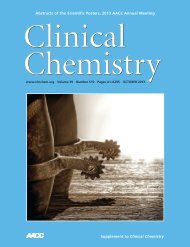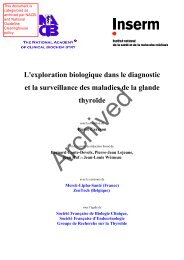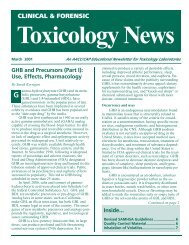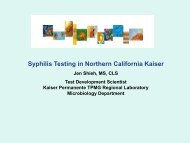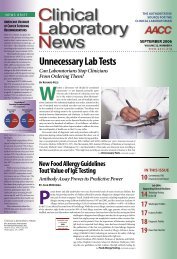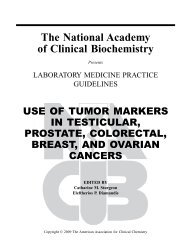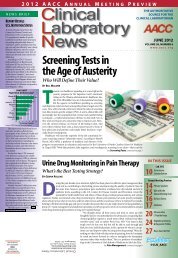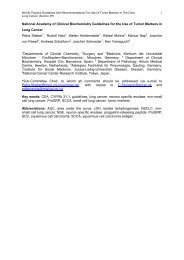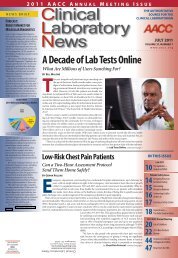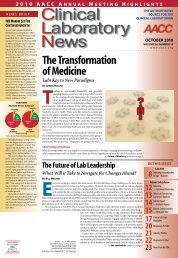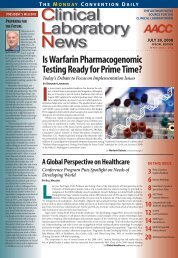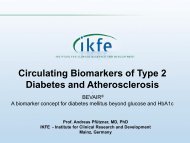Clinical Laboratory News - American Association for Clinical ...
Clinical Laboratory News - American Association for Clinical ...
Clinical Laboratory News - American Association for Clinical ...
Create successful ePaper yourself
Turn your PDF publications into a flip-book with our unique Google optimized e-Paper software.
GINA Opens Door <strong>for</strong> Research Participation<br />
Gina, from page 6<br />
Chakravarti also pointed out that genetic<br />
testing is already done on a routine<br />
basis but that not many people would<br />
recognize it as such. “Newborn screening<br />
is per<strong>for</strong>med in all 50 states and has been<br />
done so <strong>for</strong> decades, so there’s a very large<br />
number of <strong>American</strong>s who have taken a<br />
genetic test. And, blood typing is another;<br />
you can’t do transfusions without knowing<br />
someone’s genotype, and that in<strong>for</strong>mation<br />
has led to a system <strong>for</strong> donating blood, organs,<br />
and bone marrow.”<br />
GINA and Research Ef<strong>for</strong>ts<br />
Medical researchers anticipate that GINA<br />
will pave the way <strong>for</strong> individuals to take<br />
part in research without worrying about<br />
repercussions. “GINA removes a significant<br />
barrier to participation in clinical research<br />
protocols,” said Collins. “For example, at the<br />
National Institutes of Health, fear of genetic<br />
discrimination is the most commonly cited<br />
reason that people decline to participate in<br />
research on potentially life-saving genetic<br />
testing <strong>for</strong> colon cancer and breast cancer.<br />
One-third of eligible participants have declined<br />
on this basis.”<br />
Along with greater participation in<br />
clinical trials involving genetics, GINA is<br />
expected to have a positive impact on the<br />
growing field of pharmacogenomics, in<br />
which an individual’s genotype is used<br />
to guide drug therapy and/or dosage. Research<br />
in this field also has the potential to<br />
increase the safety and effectiveness of new,<br />
existing, and failed drugs, and could enable<br />
8 CliniCal laboratory news JuLy 2008<br />
more drugs to reach the market by targeting<br />
them to genetically defined subgroups<br />
of patients. “People will be more inclined<br />
to undergo genetic testing <strong>for</strong> responses to<br />
medications if they know that their test results<br />
will not affect their job or health insurance<br />
status,” explained Collins.<br />
One active area of pharmacogenomic<br />
research centers on using genetic in<strong>for</strong>mation<br />
to reduce the high incidence of adverse<br />
drug reactions, Collins added. “Consider<br />
the example of warfarin. Healthcare providers<br />
have found this anticoagulant drug<br />
notoriously difficult to administer because<br />
its dose requirements vary widely among<br />
patients and because of its relatively narrow<br />
margin <strong>for</strong> error, with either too much or<br />
too little of the drug triggering potentially<br />
life-threatening problems. Now, thanks to<br />
the identification of two genetic variations<br />
that appear to account <strong>for</strong> much of the differences<br />
in warfarin sensitivity, the National<br />
Heart, Lung, and Blood Institute is launching<br />
a clinical trial to evaluate a pharmacogenomic<br />
strategy <strong>for</strong> warfarin that will weigh<br />
the potential safety benefits with the costs<br />
of genetic testing.”<br />
So far, FDA has approved label changes<br />
<strong>for</strong> two drugs based on pharmacogenomic<br />
data. In 2005, the agency approved label<br />
changes <strong>for</strong> the chemotherapy agent irinotecan<br />
to include a warning that patients<br />
with a particular UGT1A1 genotype should<br />
receive a lower initial dose of the drug. And<br />
in 2007, the Coumadin (warfarin) package<br />
label was updated to provide in<strong>for</strong>mation<br />
about genetic testing <strong>for</strong> warfarin sensitivity.<br />
Although the FDA stopped short of<br />
personalized medicine coalition<br />
applauds enactment of Gina<br />
the personalized Medicine Coalition—a partnership of academic, industrial,<br />
patient, provider, and payer communities that includes aaCC—endorses<br />
the passage of gina into law, saying that the privacy and protection of<br />
genetic in<strong>for</strong>mation is essential to the progress of medicine, as well as improving<br />
the quality of care <strong>for</strong> every person.<br />
“the guarantees provided by this legislation will encourage millions of<br />
americans to use their genetic in<strong>for</strong>mation to improve their healthcare and<br />
to help prevent cancer and other inheritable diseases,” said edward abrahams,<br />
phd, the pMC’s executive director.<br />
only a few states have strong protections against genetic discrimination,<br />
he added, which left some individuals more vulnerable to this type<br />
of prejudice depending on where they lived. “gina provides a national<br />
framework of en<strong>for</strong>ceable protections needed to advance medical research<br />
and public health. and under gina, there now are federal rules in place to<br />
protect those who are privately insured,” abrahams said.<br />
abrahams noted that gina’s path through Congress prompted two corporate<br />
members of the pMC—ibM (armonk, n.Y.) and eli lilly (indianapolis,<br />
ind.)—to add genetic nondiscrimination to their employment policies in<br />
advance of the law’s passage. the organization noted that another pMC<br />
member, aetna (Hart<strong>for</strong>d, Conn.), also has publicly announced its support of<br />
the new law.<br />
the pMC believes that gina, along with improvements in regulatory<br />
and reimbursement policies that acknowledge the realities of geneticsbased<br />
medicine, will set the stage <strong>for</strong> the discovery of new treatments and<br />
cures, as well as an accelerated path toward personalized medicine.<br />
requiring genetic testing prior to taking<br />
the drug, it recognized that adverse bleeding<br />
events could be reduced in patients<br />
with certain variations in the CYP2C9 and<br />
VKORC1 genes involved in metabolism<br />
and uptake of the drug. Now that the barrier<br />
to individual genetic privacy has been<br />
lifted, both patients and clinicians could<br />
become more com<strong>for</strong>table with using genetic<br />
in<strong>for</strong>mation <strong>for</strong> drug dosing. This, in<br />
turn, could result in an increased demand<br />
<strong>for</strong> such tests.<br />
Testing <strong>for</strong> Inherited Breast Cancer<br />
One of the most highly impactful areas of<br />
genetic testing involves inherited <strong>for</strong>ms of<br />
breast cancer. Gregory Critchfield, MD,<br />
President of Myriad Genetic Laboratories,<br />
Inc. (Salt Lake City, Utah), the first company<br />
to offer testing <strong>for</strong> the BRCA1 and<br />
BRCA2 genes that are linked to breast<br />
cancer, is optimistic about GINA’s effect<br />
on genetic testing. “There have been some<br />
patients <strong>for</strong> whom potential insurance discrimination<br />
was an issue, and the passage



